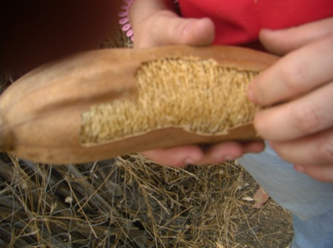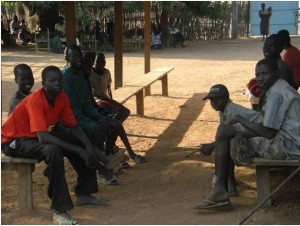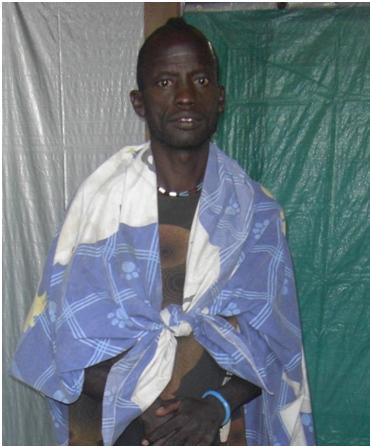A Portrait of the Dinka
This is not a scholarly work; it is not a treatise in anthropology. This is merely my blog… so don’t let the fancy title fool you. 🙂 And you could read it as a bunch of disconnected reflections, just as you could look at a rough sketch and say it was merely black scratches on canvas. Nothing in a drawing inherently makes it an image of something else; only the intention of the artist can dictate that it forms an image, and only an observer with an eye for art can pick up its imagery. So take a little trip with me; see if you can find the intention, the theme I’m hiding in my musings.
The Dinka love to laugh. If you’ve ever visited them, and spoken a single word in their language, then you know what I mean; they especially love to laugh at the mispronunciation of their language, and they’ll repeat it to others or to themselves over and over (and over…) to prolong the joke. This is perhaps better than the famous cold shoulder that the French throw up at the same offense, or the patronizing or irritable response of English speakers, or the dismissal of those who speak Arabic… but it is quite annoying, unless you manage to join in the joke. They laugh as often as they give; whenever I have visited a home, the one-room hut they call a tukul, I have been offered the food they have slaved all afternoon to make, and which they barely have enough of. If three Dinka from one village visit another, the hosts will kill a goat for them; if six people make the journey, they will be fed with bull.
They work in groups, so they can take turns at difficult tasks – and every task is difficult in Sudan. Hear the rhythmic beat of a woman pounding sorghum, and you’ll also hear the conversation and chuckles of the others : grinding okra, carrying water from the river, stirring another pot, as she waits to be the next to raise the pole and slam it down on the grains. One man might sit in the shade of the tukul being built, telling stories as he rests; another hammers away, attaching the bamboo frame for the roof – there’s too much noise for him to hear the punch lines, but he laughs anyway; yet another straightens from plastering the walls, and wipes the sweat from his brow – then snorts in chagrin at the mud he’s left on his forehead.
Mud cakes their skin as well as their houses. The fabled dust of Tonj gets everywhere, gets into everything, and you either accept it or wipe down your surfaces twenty times a day. In spite of this, some Dinka wash their feet five or so times a day (if they have easy access to water); but most are easily deterred, and simply go through their day, content to be two different colours. Their lower bodies are light brown with a rust undertone – the hue that stretches as far as the eye can see during the dry season, and is thankfully covered by the richest foliage in every imaginable shade of green during the wet. Their upper bodies, on the other hand, are the intended shade: the rich black-brown of an espresso-roasted coffee bean, glossy from the oil released by the heat; or of unvarnished ebony wood that has been soaked through by a rainstorm.
When the Dinka sing, they beat metal pots on the ground, and their voices rise, lower, roll, sway… When the Dinka dance, it is without the sway that I know from the Caribbean; they hold their backs straight, as their legs move energetically, stamping, pounding out the beat; or they leap straight up in the air – two might face off in a circle of spectators and compete for height and endurance. When the Dinka speak, they speak softly, and will repeat as often as necessary in response to the listener’s “Eh?” but won’t raise that voice… unless they are singing, or telling one of those stories, and laughing uproariously… or unless they raise those voices in conflict.
The Dinka love to fight. Or so it would seem; for they do it often, for real and imagined slights. Everyone fights, whether old or young, male or female, rich or poor, heavy with child or barren. They use their fists, and rocks, and sticks, and spears, and guns, and bombs; they have not used the latter in four years or so, but the evidence of their use lives among the Dinka, overgrown by trees and vines, and blending into the land… but still there. The Dinka use their words to fight, too; if you sit outside in a quiet hour, and filter through the many sounds you hear – trucks rolling by in the distance, donkeys braying as if caught in the jaws of a lion, radios playing music in Arabic – you can also often find the sound of someone yelling, or a child crying. As I write this, I can hear two children crying.
They decorate themselves with scars. When men reach adulthood, lines are drawn into their foreheads, using a knife to just break the skin. As they age, the lines fade; an old man looks as if he’s spent his lifetime frowning. The women make beautiful marks on their skin in the same way – flowers around their navels, boxes with X’s or symmetrical curlicues inside them on their chests and cheeks, soft curves fanning out from the eyes… it amuses me to think that the crow’s feet we fear in the West are ornamental in Sudan. And I’ve grown less ashamed of the many scars I have on my body; for here, everyone has scars, whether they were put there by misfortune or design.
But unlike me, no one has any hair. An exaggeration, I grant; but it’s quite remarkable, nonetheless. With no need to trap heat using a coat, the Dinka have been blessed with perfectly smooth skin. Barely any eyebrows; sparse underarm hair; and there’s no need to wax the legs! Even the hair on their heads doesn’t grow more than a few inches; and so, human-like, braided hair is a common augmentation to their natural beauty. And it’s quite easy to identify someone of Arab descent – just look for the full head of hair, or the thick beard. Standing out like that must have been troublesome during the civil war years; but now, it is common to see the hairy head nodding to greet the head of short hair.
Even without long hair or braids, Dinka women are beautiful. Flat-out gorgeous. A scout for a modelling agency could live off the fat of the land here… They are tall and willowy (as are all Dinka – even those that live well do not put on more that a little roll around the belly), with slender heads and high cheekbones; and when you get one to smile, especially the embarrassed and flattered smile of the recently-complimented, it is like the sun after a thunderstorm. And though the years and the extraordinarily hard life of a Sudanese woman can make her grow haggard far too soon, sometimes, one will retain that beauty into her old age – though the measure of old age is different in countries with shorter life expectancies. I see a parallel: colours are brighter, here. Sugar is sweeter. Water is more refreshing.
I often catch myself staring at the beauty that is so extraordinary in a place that is sometimes so ugly. It shows in the children, too – when they are healthy. Children aren’t very highly valued, here, and sometimes neglect robs a child of a beauty that might shine out if they were properly cared for: dressed in clean clothes, fed well, hugged more often. But though there are beautiful girls, and beautiful women, and even beautiful boys, there are no beautiful men. I have waited, sure that the day I saw a Sudanese man who had the characteristics of authentic male beauty – that day would be one I would mark as a great day. It has not come. Somewhere along the way, a switch is flipped, and the boy that I could say was truly lovely, hardens, and becomes a man. I could call their appearance strong, serious, commanding… but not handsome. There is no loveliness about them… unless you catch them in the middle of a laugh.
An anthropologist might say that the Dinka laugh because their lives are hard; their only recourse is to laugh at pain, for otherwise they would always be weeping. And they may be right; as I pen these reflections, some Dinka who have been displaced by violence in a nearby town are waiting outside a shelter for food, and they are clapping and singing to entertain themselves. But this reminds me of when Paul and Silas lay in prisoner’s chains, and yet praised God – not to please themselves, but to please their God; “and the other prisoners were listening to them”.[i] When we suffer, do we simply look for solace, or do we also take the time to bless others, and our Lord?
An anthropologist might say that the Dinka love to fight because that is what they know; they were born or raised in war, bred in a culture of conflict and raw survival, and they have many good reasons to be angry. And they may be right; there is still an undercurrent of hostility towards “those difficult Arabs”…and yet, all the fighting I have known in my time here has been between Dinka and Dinka. This reminds me of when Peter cut off the ear of Malchus, the servant of the high priest – he too had good reason to be angry, and to fight; but “man’s anger does not bring about the righteous life that God desires”.[ii] Jesus rebuked him, and healed Malchus – and then allowed Himself to be led away to suffer by the very man whose suffering He had just removed.
On the one hand, the Dinka know the good life, sing despite hardship, work together and love their neighbours, behaving just like the only Son of Man who was good. On the other hand, they disregard Him and scramble for power and self-worth, instead of looking to the True Source of each. We sway in the same manner. The old man is quick to be angry; the new creation desires the peace which passes all understanding. This theme is universal. It runs through all men, not just the Dinka. You can see it yourself, in your own back yard, if you have the eye for it.
Despite my opening promise, I have talked on for three pages… and yet, this was just a little trip. It was only a rough sketch. If I had the time to write, and you had the time to read, I could shade it in, add perspective and depth, paint in some colour; or you could get up, board a plane, and take a longer journey. “Take the wings of the morning… settle on the far side of the sea”,[iii] and come see the Dinka with your own eyes. Or look at the people around you. Are they just scratches on canvas? Or do you perceive the intention of the Artist… espy the evidence that there is an Artist? Can you see that we are made in His image?


